北京市海淀区2012届高三第二学期期中练习试题(英语)扫描版
- 格式:doc
- 大小:591.00 KB
- 文档页数:18
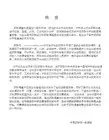
北京市海淀区高三年级第二学期英语期中练习英语本试卷共12页,共10分。
考试时长120分钟。
考生务必将答案写在答题卡和答题纸上,在试卷上作答无效。
考试结束后,将本试卷、答题卡、答题纸一并交回。
第I卷第一部分:听力理解第一节听下面段对话。
每段对话后有一道小题,从每题所给的A、B、三个选项中选出最佳选项。
听完每段对话后,你将有10秒钟的时间来回答有关小题和阅读下一小题。
每段对话你将听一遍。
.hendidtheanprbablleavethegate?A.At12:00B.At12:30..At1:00.2.hatdestheansuggest?A.Seeingthevie.B.Gingtbedearl.Stainguptilleleven3.heredesthisnversatinstprbabltaeplae?A.Inarestaurant.B.Inagrer.Inalibrar.4.Hdestheanfeelabutthebusservie?A.Dissatisfied.B.Pleased..Puzzled.hatistheanding?A.aingaphneall.B.aingavisit..ainganappintent.第二节听下面4段对话。
每段对话后有几道小题,从每题所给的A、B、三个选项中选出最佳选项。
听每段对话前,你将有秒钟的时间阅读每小题。
听完后,每小题将给出秒钟的作答时间。
每段对话你将听两遍。
听第6段材料,回答第6至7题。
6.hatarethespeaersainltalingabut?A.Dinner.B.TVprgra..eather.7.hhavethedeidedtginside? A.Thefeelratherldutside.B.Thetrtavidthesunshine .TheanttathaTVprgra.听第7段材料,回答第8至9题。
8.Hdestheanseetfeelafterthisbintervie? A.AnxiusB.Hpeful..Desperate.9.Hanandidatesereabletgtthesendintervie? A.4B.12..16.听第8段材料,回答第10至12题。
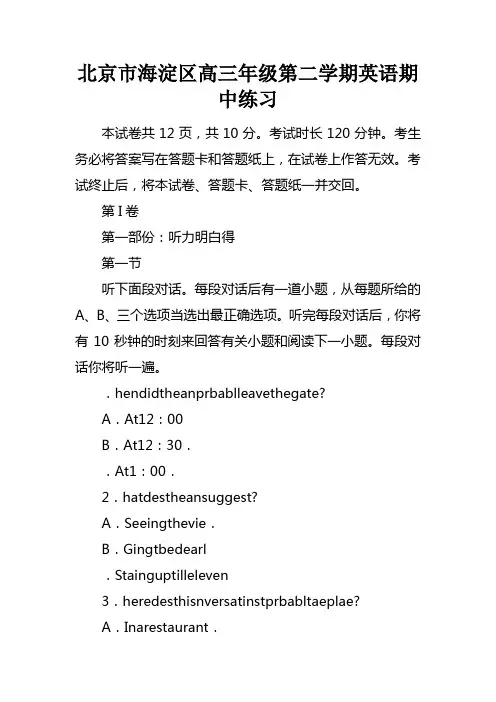
北京市海淀区高三年级第二学期英语期中练习本试卷共12页,共10分。
考试时长120分钟。
考生务必将答案写在答题卡和答题纸上,在试卷上作答无效。
考试终止后,将本试卷、答题卡、答题纸一并交回。
第I卷第一部份:听力明白得第一节听下面段对话。
每段对话后有一道小题,从每题所给的A、B、三个选项当选出最正确选项。
听完每段对话后,你将有10秒钟的时刻来回答有关小题和阅读下一小题。
每段对话你将听一遍。
.hendidtheanprbablleavethegate?A.At12:00B.At12:30..At1:00.2.hatdestheansuggest?A.Seeingthevie.B.Gingtbedearl.Stainguptilleleven3.heredesthisnversatinstprbabltaeplae?A.Inarestaurant.B.Inagrer.Inalibrar.4.Hdestheanfeelabutthebusservie?A.Dissatisfied.B.Pleased..Puzzled.hatistheanding?A.aingaphneall.B.aingavisit..ainganappintent.第二节听下面4段对话。
每段对话后有几道小题,从每题所给的A、B、三个选项当选出最正确选项。
听每段对话前,你将有秒钟的时刻阅读每题。
听完后,每题将给出秒钟的作答时刻。
每段对话你将听两遍。
听第6段材料,回答第6至7题。
6.hatarethespeaersainltalingabut?A.Dinner.B.TVprgra..eather.7.hhavethedeidedtginside?A.Thefeelratherldutside.B.Thetrtavidthesunshine .TheanttathaTVprgra.听第7段材料,回答第8至9题。
8.Hdestheanseetfeelafterthisbintervie? A.AnxiusB.Hpeful..Desperate.9.Hanandidatesereabletgtthesendintervie? A.4B.12..16.听第8段材料,回答第10至12题。
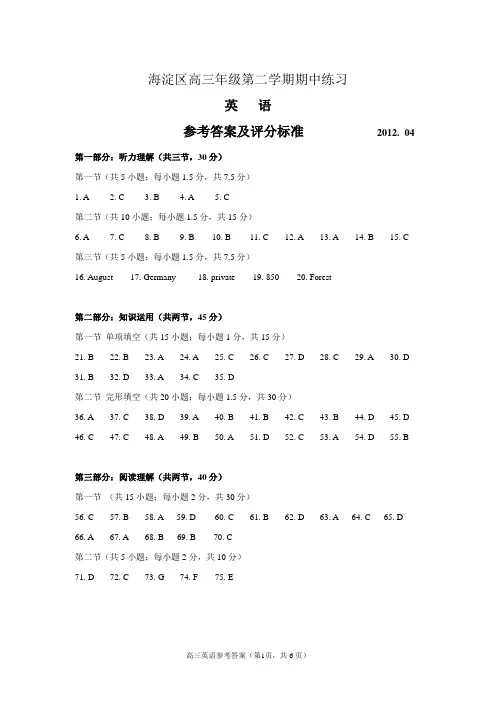
海淀区高三年级第二学期期中练习英语参考答案及评分标准2012. 04 第一部分:听力理解(共三节,30分)第一节(共5小题;每小题1.5分,共7.5分)1. A2. C3. B4. A5. C第二节(共10小题;每小题1.5分,共15分)6. A7. C8. B9. B 10. B 11. C 12. A 13. A 14. B 15. C 第三节(共5小题;每小题1.5分,共7.5分)16. August 17. Germany 18. private 19. 850 20. Forest第二部分:知识运用(共两节,45分)第一节单项填空(共15小题;每小题1分,共15分)21. B 22. B 23. A 24. A 25. C 26. C 27. D 28. C 29. A 30. D 31. B 32. D 33. A 34. C 35. D第二节完形填空(共20小题;每小题1.5分,共30分)36. A 37. C 38. D 39. A 40. B 41. B 42. C 43. B 44. D 45. D 46. C 47. C 48. A 49. B 50. A 51. D 52. C 53. A 54. D 55. B第三部分:阅读理解(共两节,40分)第一节(共15小题;每小题2分,共30分)56. C 57. B 58. A 59. D 60. C 61. B 62. D 63. A 64. C 65. D 66. A 67. A 68. B 69. B 70. C第二节(共5小题;每小题2分,共10分)71. D 72. C 73. G 74. F 75. E第四部分:书面表达(共两节,35分)第一节情景作文(20分)一、评分原则:1.本题总分为20分,按5个档次给分。
2.评分时,先根据文章的内容和语言质量初步确定其档次,然后以该档次的要求来衡量,确定或调整档次,最后给分。
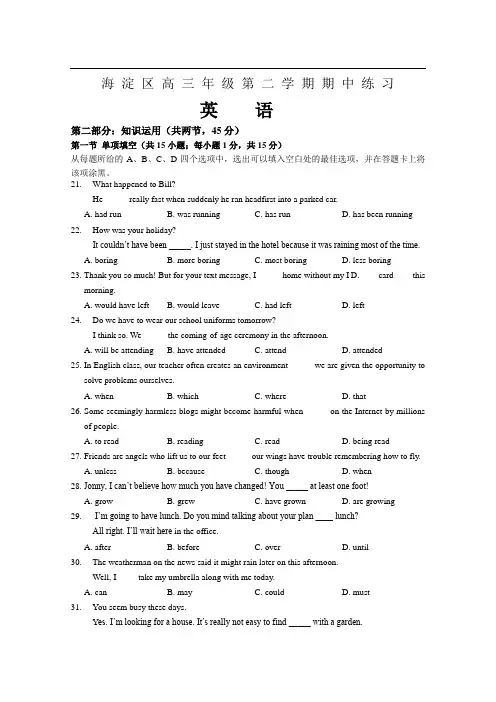
海淀区高三年级第二学期期中练习英语第二部分:知识运用(共两节,45分)第一节单项填空(共15小题;每小题1分,共15分)从每题所给的A、B、C、D四个选项中,选出可以填入空白处的最佳选项,并在答题卡上将该项涂黑。
21. ---What happened to Bill?---He _____ really fast when suddenly he ran headfirst into a parked car.A. had runB. was runningC. has runD. has been running22. ---How was your holiday?---It couldn’t have been _____. I just stayed in the hotel because it was raining most of the time.A. boringB. more boringC. most boringD. less boring23. Thank you so much! But for your text message, I _____ home without my I D. card thismorning.A. would have leftB. would leaveC. had leftD. left24. ---Do we have to wear our school uniforms tomorrow?---I think so. We _____ the coming-of-age ceremony in the afternoon.A. will be attendingB. have attendedC. attendD. attended25. In English class, our teacher often creates an environment _____ we are given the opportunity tosolve problems ourselves.A. whenB. whichC. whereD. that26. Some seemingly harmless blogs might become harmful when _____ on the Internet by millionsof people.A. to readB. readingC. readD. being read27. Friends are angels who lift us to our feet _____ our wings have trouble remembering how to fly.A. unlessB. becauseC. thoughD. when28. Jonny, I can’t believe how much you have changed! You _____ at least one foot!A. growB. grewC. have grownD. are growing29. --- I’m going to have lunch. Do you mind talking about your plan ____ lunch?---All right. I’ll wait here in the office.A. afterB. beforeC. overD. until30. ---The weatherman on the news said it might rain later on this afternoon.---Well, I ____ take my umbrella along with me today.A. canB. mayC. couldD. must31. ---You seem busy these days.---Y es. I’m looking for a house. It’s really not easy to find _____ with a garden.A. thisB. oneC. itD. that32. Although the Eiffel Tower _____ to last for 20 years, it is still standing today.A. has designedB. had designedC. is designedD. was designed33. Shooting, as ____ means of survival originally, developed into _____ sport only in the late 19thcentury.A. a; aB. the; theC. a; theD. the; a34. ______ the housing price, several measures have been adopted in the last two years.A. LoweringB. Having loweredC. To lowerD. To have lowered35. In my point of view, the question is not _____ the world is going to have a new economic crisis,but when.A. thatB. howC. whatD. whether第二节完形填空(共20小题;每小题1.5分,共30分)阅读下面短文,掌握其大意,从每题所给的A、B、C、D四个选项中,选出最佳选项,并在答题卡上将该项涂黑。
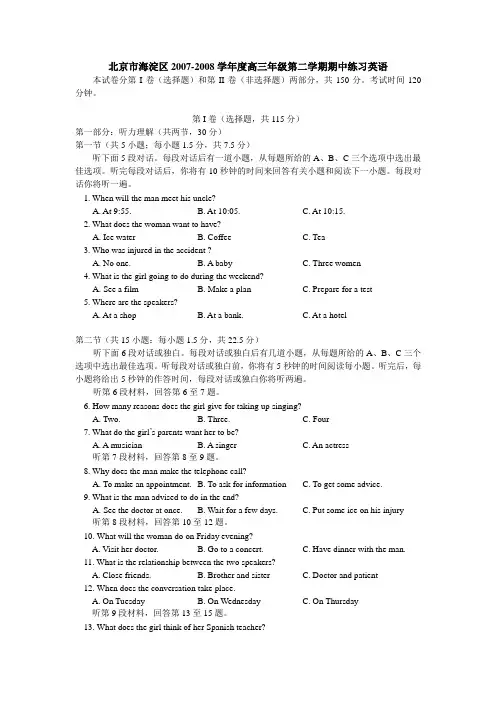
北京市海淀区2007-2008学年度高三年级第二学期期中练习英语本试卷分第I卷(选择题)和第II卷(非选择题)两部分,共150分。
考试时间120分钟。
第I卷(选择题,共115分)第一部分:听力理解(共两节,30分)第一节(共5小题;每小题1.5分,共7.5分)听下面5段对话。
每段对话后有一道小题,从每题所给的A、B、C三个选项中选出最佳选项。
听完每段对话后,你将有10秒钟的时间来回答有关小题和阅读下一小题。
每段对话你将听一遍。
1. When will the man meet his uncle?A. At 9:55.B. At 10:05.C. At 10:15.2. What does the woman want to have?A. Ice waterB. CoffeeC. Tea3. Who was injured in the accident ?A. No one.B. A babyC. Three women4. What is the girl going to do during the weekend?A. See a filmB. Make a planC. Prepare for a test5. Where are the speakers?A. At a shopB. At a bank.C. At a hotel第二节(共15小题:每小题1.5分,共22.5分)听下面6段对话或独白。
每段对话或独白后有几道小题,从每题所给的A、B、C三个选项中选出最佳选项。
听每段对话或独白前,你将有5秒钟的时间阅读每小题。
听完后,每小题将给出5秒钟的作答时间,每段对话或独白你将听两遍。
听第6段材料,回答第6至7题。
6. How many reasons does the girl give for taking up singing?A. Two.B. Three.C. Four7. What do the girl’s parents want her to be?A. A musicianB. A singerC. An actress听第7段材料,回答第8至9题。
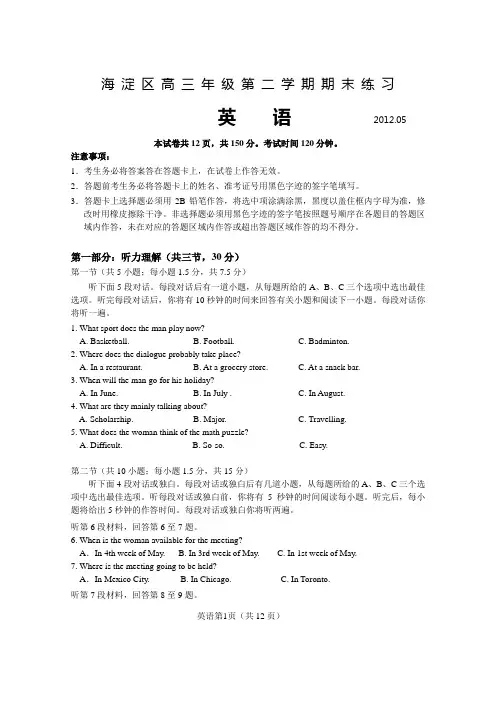
海淀区高三年级第二学期期末练习英语2012.05本试卷共12页,共150分。
考试时间120分钟。
注意事项:1.考生务必将答案答在答题卡上,在试卷上作答无效。
2.答题前考生务必将答题卡上的姓名、准考证号用黑色字迹的签字笔填写。
3.答题卡上选择题必须用2B铅笔作答,将选中项涂满涂黑,黑度以盖住框内字母为准,修改时用橡皮擦除干净。
非选择题必须用黑色字迹的签字笔按照题号顺序在各题目的答题区域内作答,未在对应的答题区域内作答或超出答题区域作答的均不得分。
第一部分:听力理解(共三节,30分)第一节(共5小题;每小题1.5分,共7.5分)听下面5段对话。
每段对话后有一道小题,从每题所给的A、B、C三个选项中选出最佳选项。
听完每段对话后,你将有10秒钟的时间来回答有关小题和阅读下一小题。
每段对话你将听一遍。
1. What sport does the man play now?A. Basketball.B. Football.C. Badminton.2. Where does the dialogue probably take place?A. In a restaurant.B. At a grocery store.C. At a snack bar.3. When will the man go for his holiday?A. In June.B. In July .C. In August.4. What are they mainly talking about?A. Scholarship.B. Major.C. Travelling.5. What does the woman think of the math puzzle?A. Difficult.B. So-so.C. Easy.第二节(共10小题;每小题1.5分,共15分)听下面4段对话或独白。
每段对话或独白后有几道小题,从每题所给的A、B、C三个选项中选出最佳选项。
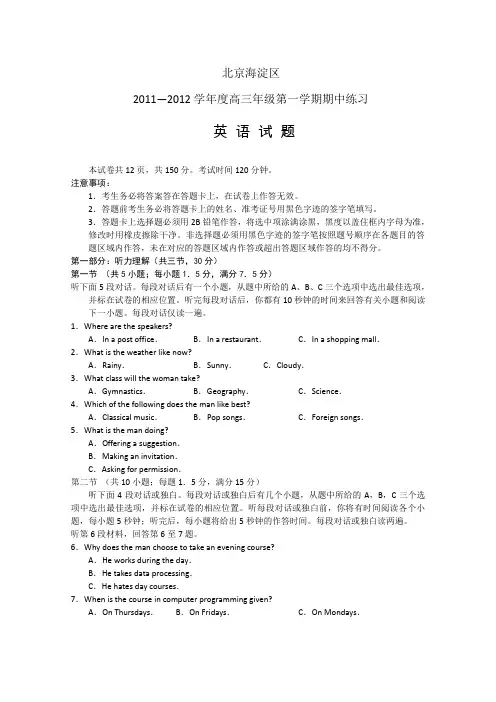
北京海淀区2011—2012学年度高三年级第一学期期中练习英语试题本试卷共12页,共150分。
考试时间120分钟。
注意事项:1.考生务必将答案答在答题卡上,在试卷上作答无效。
2.答题前考生务必将答题卡上的姓名、准考证号用黑色字迹的签字笔填写。
3.答题卡上选择题必须用2B铅笔作答,将选中项涂满涂黑,黑度以盖住框内字母为准,修改时用橡皮擦除干净。
非选择题必须用黑色字迹的签字笔按照题号顺序在各题目的答题区域内作答,未在对应的答题区域内作答或超出答题区域作答的均不得分。
第一部分:听力理解(共三节,30分)第一节(共5小题;每小题1.5分,满分7.5分)听下面5段对话。
每段对话后有一个小题,从题中所给的A、B、C三个选项中选出最佳选项,并标在试卷的相应位置。
听完每段对话后,你都有10秒钟的时间来回答有关小题和阅读下一小题。
每段对话仅读一遍。
1.Where are the speakers?A.In a post office.B.In a restaurant.C.In a shopping mall.2.What is the weather like now?A.Rainy.B.Sunny.C.Cloudy.3.What class will the woman take?A.Gymnastics.B.Geography.C.Science.4.Which of the following does the man like best?A.Classical music.B.Pop songs.C.Foreign songs.5.What is the man doing?A.Offering a suggestion.B.Making an invitation.C.Asking for permission.第二节(共10小题;每题1.5分,满分15分)听下面4段对话或独白。
每段对话或独白后有几个小题,从题中所给的A,B,C三个选项中选出最佳选项,并标在试卷的相应位置。
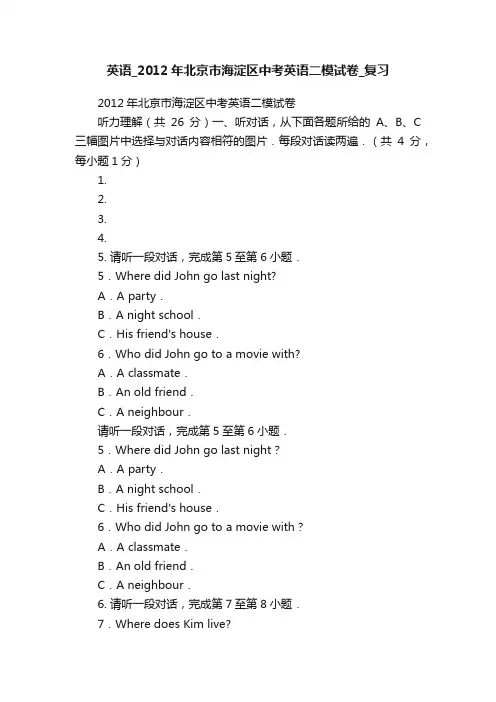
英语_2012年北京市海淀区中考英语二模试卷_复习2012年北京市海淀区中考英语二模试卷听力理解(共26分)一、听对话,从下面各题所给的A、B、C 三幅图片中选择与对话内容相符的图片.每段对话读两遍.(共4分,每小题1分)1.2.3.4.5. 请听一段对话,完成第5至第6小题.5.Where did John go last night?A.A party.B.A night school.C.His friend's house.6.Who did John go to a movie with?A.A classmate.B.An old friend.C.A neighbour.请听一段对话,完成第5至第6小题.5.Where did John go last night?A.A party.B.A night school.C.His friend's house.6.Who did John go to a movie with?A.A classmate.B.An old friend.C.A neighbour.6. 请听一段对话,完成第7至第8小题.7.Where does Kim live?A.In downtown.B.In the countryside.C.On Center Street.8.What is near Gina's house?A.A Chinese restaurant.B.A sports center.C.A pizza place.请听一段对话,完成第7至第8小题.7.Where does Kim live?A.In downtown.B.In the countryside.C.On Center Street.8.What is near Gina's house?A.A Chinese restaurant.B.A sports center.C.A pizza place.7. 请听一段对话,完成第9至第10小题.9.How's the weather in Mexico City?A.It's cold.B.It's nice.C.It's hot.10.What could a visitor do in Miami?A.Visit the Natural Museum.B.Go to the Palace of Fine Arts.C.Spend time on the beach.请听一段对话,完成第9至第10小题.9.How's the weather in Mexico City?A.It's cold.B.It's nice.C.It's hot.10.What could a visitor do in Miami?A.Visit the NaturalMuseum.B.Go to the Palace of Fine Arts.C.Spend time on the beach.8. 请听一段对话,完成第11至第13小题. 11.What time does Helen start work?A.Around ten.B.At three.C.Around six am.12.How many hours does Daniel work a day? A.Two.B.Four.C.Seven.13.What's Daniel's part-time job?A.A writer.B.A TV announcer.C.A dog walker.请听一段对话,完成第11至第13小题.11.What time does Helen start work?A.Around ten.B.At three.C.Around six am.12.How many hours does Daniel work a day?A.Two.B.Four.C.Seven.13.What's Daniel's part-time job?A.A writer.B.A TV announcer.C.A dog walker.9. 请听一段独白,完成第14至第16小题.14.How long should the film last?A.More than 12 minutes.B.About 18 minutes.C.Less than 12 minutes.15.What can you learn from the talk?A.You could have more than three main characters. B.This year's films are about the family.C.You can send your films to our school.16.What's the talk mainly about?A.How to make films.B.Introduction of different kinds of films.C.A film-making competition.请听一段独白,完成第14至第16小题.14.How long should the film last?A.More than 12 minutes.B.About 18 minutes.C.Less than 12 minutes.15.What can you learn from the talk?A.You could have more than three main characters.B.This year's films are about the family.C.You can send your films to our school.16.What's the talk mainly about?A.How to make films.B.Introduction of different kinds of films.C.A film-making competition.10. 听对话,根据所听到的对话内容和提示词语,记录关键信息.对话读两遍.Interview NotesWhom interviewed:(17)________What want to be:a weather(18)________How old interested in weather:(19)________When to start the weather club:in(20)________,2008Weather she likes:(21)________ and rainy.知识运用(共25分)四、单项填空.(共13分,每小题1分)从下面各题所给的A、B、C、D四个选项中,选择可以填入空白处的最佳选项.11. Dogs are my sister's favorite pets.These cute dogs are _____.()A mineB theirsC hisD hers12. I'd like to go to the music club with you,______ I have to look after my grandfather in hospital.()A butB andC orD so13. Of all the subjects,art is _____ for me.()A interestingB more interestingC most interestingD the most interesting14. I have two vacation plans.One is going to the summer camp,________ is being a volunteer.()A anotherB otherC the otherD others15. The student from Japan _____ outgoing and popular in our class.()A amB isC areD be16. ____ tourists got lost in the mountains so they called the police for help.()A FewB A fewC LittleD A little17. --Must I feed the fish every day?--No,you ______.You can feed them every two days.()A can'tB mustn'tC needn'tD may not18. Don't make little children _____ the things that they dislike.()A doB to doC doingD done19. --Where is Nancy?--She is in the hall.She _____ a speech on Chinese culture.()A is makingB makesC has madeD made20. --Is your brother in Beijing?--No.He ______ to London for the Olympics.()A wentB has goneC has beenD will go21. The plane _____ after the heavy rain stopped.()A takes offB took offC will take offD has taken off22. A new shopping mall ______ near my home in five years.()A has been builtB is builtC was builtD will be built23. Can you tell me _____ next weekend?I'm going to book tickets.()A if do you watch the 3D film TitanicB if you watch the 3D film TitanicC if will you watch the 3D film Titanic D if you will watch the 3D film Titanic五、完形填空.(共12分,每小题12分)24. 阅读下面的短文,掌握其大意,然后从短文后各题所给的A、B、C、D四个选项中,选择最佳选项.At lunchtime, Bonnie and Ruth sat together like they always did at school.Ruth and Bonni e were best friends and best friends always sat together for lunch.They(1)________sandwiches, cupcakes and almost everything.But today things were different.Bonnie looked upset, andRuth did not know why."Why are you sad today, Bonnie? "Ruth asked."Because my daddy(2)________ his job yesterday, "she said."And we may have to move.My mom and dad are very unhappy and they always argue.I am(3)________.What is going to happen to us? "Bonnie's news made Ruth very sad, too.What would school be like(4)________ Bonnie? What could she do to help her friend? When Ruth went home she told her m om the bad (5)________."What can I do to help? "she asked."I'm not sure, Ruth, "said her mother sadly.Ruth thought and thought.She thought while she ate supper and she thought while she di d homework.She even thought when she brushed her teeth before going to bed."What can I do? "she(6)________.The next day was Saturday and Ruth woke up very early.She dressed and ate a quick brea kfast, then went to find her friends.They all decided to(7)________ together to help Bonnie.They pulled weeds, played with babies and walked dogs.T hey even put on a Talent show in Ruth's backyard.All the adults paid one dollar to watch th e(8)________ sing and dance and do magic tricks.After the performance, the children(9)________their money.They had made three hundred dollars!Ruth's mom took them to the gro cery store and they bought food, soap, paper towels, and all kinds of things that a person mig ht need.When they left the store they went to Bonnie's house and each of the children(10)________ carried a bag to the door, rang the doorbell and ran, giggling all the way.They had so much fun with(11)________secret surprise!They knew it would make Bonnie very happy.Ruth felt happy too, because she had helped her friend.She knew it wasn't much, but all s he needed to do was to show her friend that she(12)________.I think Bonnie got the message, don't you?(1)A foundB expectedC sharedD bought(2)A changedB lostC enjoyedD got(3)A worriedB lonelyC disappointedD surprised(4)A toB withC forD without(5)A storyB resultC newsD report(6)A dreamtB questionedC talkedD wondered (7)A workB studyC meetD think (8)A parentsB actorsC studentsD children (9)A collectedB savedC countedD spent (10)A gentlyB quietlyC seriouslyD patiently (11)A theirB hisC herD its(12)A helpedB caredC understoodD realized四、阅读理解(共44分)阅读下列短文,根据短文内容,从短文后各题所给的A、B、C、D四个选项中,选择最佳选项.(共26分,每小题6分)25.(1)We can enjoy Mattaponi Culture Day at________.A 9:00a.B 3:00p.C 6:00p.D 10:00p.(2)If Tom,15 years old,wants to enjoy that day with his parents,they need to pay________.A 6dollars.B 12dollars .C 18dollars .D 24dollars.(3)What can we do on that day?________A Make baskets.B Sing songs.C Tell stories.D Play games.26. A Native American and his friend were in downtown New York City, walking near Times Square in Manhattan.It was during the noon lunch hour and the streets were filled with t he noise of people andcars.Suddenly, the Native American said, "I hear a cricket (蟋蟀)."His friend said, "What? You must be crazy.You couldn't possibly hear a cricket in all of this noise!""No, I'm sure of it, "the Native American said, "I heard a cricket.""That's crazy, "said the friend.The Native American listened carefully for a moment, and then walked across the street to a big wall.There they saw bushes (灌木).He looked into the bushes, and sure enough, he found a small cricket.His friend was q uite amazed."That's unbelievable, "said his friend."You must have superhuman ears!""No, "said the Native American."My ears are not different from yours.It all depends on what you're listening for.""But that can't be!"said the friend."I could never hear a cricket i n this noise.""Yes, it's true, "came the reply."It depends on what is really important to you.Here, let me show you."He reached into his pocket, pulled out a few coins, and dropped them on the sidewalk.And then, with the noise of the crowded street still in their ears, they noticed ever y head within 20feet turn and look to see if the money was theirs."See what I mean? "asked the Native American."It all depends on what's important to yo u."(1)The Native American was________ with his friend when he heard a cricket.A taking a walk.B watching people walking.C looking for crickets.D looking f or important things.(2)His friends felt________ after they found the cricket.A unsure.B crazy.C relaxed.D amazed.(3)The writer wants to tell________.A people pay more attention to what is important to them.B people wonder what is i mportant to them.C people can hear different sounds.D people believe what the y heard.27. British HumorIs it true that the British laugh at different things from people in other countries? Let's hav e a look at what we laugh at in Britain.To the British, the powerful and important are often figures of fun.It's not just politicians (政治家) who make us laugh quietly, but anyone whose job it is to tell other people what to do an d who take themselves too seriously.We giggle at authority(权威), but also, kindly with anyone who is treated unfairly.We know they can't win, but if th ey do so sometimes, it's even funnier.Our clowns are often silly people doing silly things, w hile in America, they are often clever people doing clever things-and winning.The British laugh when other people might feel very worried.People say that the British a re cold andunwilling to show their feelings and this is expressed in our humor.I don't really think th at's true but I know that we do havea strong sense of irony (反讽)."Not very pleasant", we say after some terrible experience.Along with this, is our love of understatement (轻描淡写)."It's a bit windy today"we might say in the middle of a typhoon, or"There's a slight problem"when something has gone very seriously wrong.A British comedian will often begin by saying"Have you ever noticed…..? "We find humor in ordinary, boring life, especially its negative aspects.As well as this, we find it amusing to tel l jokes about things that have gone wrong for us, rather than not mentioning them in case we look stupid.Our funny stories might start with"I'm such an idiot, I did something really stu pid yesterday".Another thing that can make it difficult to understand"British humor"is that we don't alwa ys laugh or even smile when we say something funny.We often"keep a straight face"even w hen we're making a joke.So, is the British sense of humour unique? Well, probably not.It is the combination of all t hese features that make the British laugh and make so many other people ask"Why is that fu nny? "(1)Which of the following is the British humor?________A The British laugh at themselves.B The British laugh at things that are rude.C The British laugh when they meet boring people.D The British laugh when they think t hings are funny.(2)The underlined phrase"keep a straight face"means the British________.A look confused.B stop laughing.C make a face .D seem expressionless.(3)The writer thinks________.A the British politicians are funny people.B the British sometimes laugh when others might cry.C the British like to tell jokes in pleasant situations.D the British hum or is easy for other people to understand.28. For eight weeks last summer, scientists from several universities and government weat her laboratories carried out the Severe Thunderstorm Electrification and Precipitation Study (STEPS).They set up a center in Goodland, Kansas, home to some of the heaviest thunder storms(雷暴雨) in the United States.In this area, humid air from the Gulf of Mexico meets hot, dry air f rom the southwest, resulting in storms so huge that they can last for days as they move east a cross the country.The scientists working in Goodland were trying to learn as much as they could about these disordered storm systems.They already knew that the combination of strong winds, large a mounts of moisture(潮湿), and big differences in temperatures could produce thunderheads, known as Super Cells .They also knew that super cells could produce terrible weather, including tornadoes(龙卷风).What the scientists did not know, however, was why some super cells produce heavy ra in, lightning, and tornadoes, while others produce large hail(冰雹)that can destroy a wheat crop or a roof.The scientists supposed that the physical characteri stics of storm clouds would give the reason for such differences.To study the storm clouds, the researchers in Goodland met each morning and studied weather data(数据), hoping for bad weather.Their cars, equipped with weather instruments, were ready .Whenever a storm came near, some scientists drove toward the storm front and began coll ecting data on winds, temperature, air pressure, and humidity.During the storm, they also c alculated the time and place of every lightning strike.At the same time that the scientists on the ground were collecting their data, researchers i n the air were operating a special radar station that would help them measure the shape and size of the water drops inside the clouds.These scientists rode in a single-engine plane specifically designed to fly through terrible weather systems.While the pilot g uided the plane through heavy wind, lightning, hail, and ice, the scientists on board collected their storm data.Researchers say that it will take years for them to understand all the data they have collect ed.Their hope is that by comparing the conditions on the ground with the conditions in the air, it may be possible to learn much more about how lightning is produced, why some storm s produced baseball-sized hail, and why others produce floods and tornadoes.(1)According to the passage,large,disordered storm systems can be caused________.A by tornadoes. B by large hail and ice. C when humid air and hot,dry air meet. D when water drops make clouds grow too large.(2)Which of the following actions did the scientists carryout first?________A They collected storm data.B They waited for bad weather.C They measured w ater drops.D They drove toward the storm front.(3)The research data collected by the scientists in Kansas________.A was so great that it will take time to sort out properly.B has provided clear answers to the scientists'questions.C will lead to other research projects at the STEPS labs.D has explained why some storms produce hail and others do not.(4)What's the passage mainly about?________A How scientists used what they knew about storms in their research.B How the scien tists tried to learn more about serious storm systems.C How scientists collected differe nt data on land and in the air.D How scientists chose Goodland Kansas as their researc h base.五、阅读短文,根据短文内容,从短文后的五个选项中选出能填入空白处的最佳选项.选项中有一项为多余选项.(共8分,每小题8分)29.Maria Martinez is remembered today as the maker of beautiful pottery.Her pottery is in mu seums all over the world.(60)________ She lived in New Mexico in America.As a young woman,Maria was known for the fine pots she made.Maria and theother village women made pots for their families.They also sold pots to visitors.In 1908,some archaeologists (考古学家)found broken bits of pottery in Maria's village.They belonged to Americans who lived there 700years before.(61)________ They were thinner than Maria's pots.The finds influenced her art.Maria decided t o make such a pot.Her husband helped her.They had to find a way to make the pot thinne r.Maria knew the clay she used would not work.A thin pot made out of that clay would cr ack (破裂)easily.Maria mixed different amounts of clay,sand,and water.(62)________ Maria produced many pots in her lifetime.(63)________ They are keeping the old ways alive just as Maria had done before.A.Her son and grandson also learned how to make beautiful pots.B.At last,she discovered a mix that would not crack.C.Maria taught her husband how to make pots.D.Then the archaeologists showed them to Maria.E.Maria was born around 1881.六、阅读短文,根据短文内容回答问题.(共10分,每小题10分)30. As mobile phones grow in popularity,telephone booths have become fewer in German cities.But a new project in Berlin is hoping to turn them into shelters for another endangered technology-books.Konrad Kutt of the Institute for Sustainability in Education,Employment and Culture decided to start the BücherboXX project to improve reading in Berl in.They filled telephonebooths that are about to be thrown away with books and put bench es outside for people to sit down and take a reading break."It teaches people about reusing in details,about sustainability (持续性) and also about improving learning,"said Kutt.These public bookshelves are in the streets of many cities across Germany.The se libraries are supported by donations and taken care by local volunteer groups.Each shelf holds around 200 books.It takes about six weeks to replace the old books with new ones.Each of Berlin's three current reading booths has been colourfully painted by students who a re also responsible for building the benches and bookshelves inside the booths.The telepho ne booths themselves were bought from telephone companies that set to just throw them aw ay.Some community members keep an eye on the booths to prevent destroying and make sure t hey are often cleaned.In these libraries,people can read whatever they want to read.Local people who visit the booths are encoura ged to leave one of their own books when they take a book with them.There are no sign-out sheets or rules for visitors to follow,like at a library because the BücherboXX system relies on trust and the community's good wi ll.One woman named Petra Rücker,a 45-year-old social worker,stopped by to take a look at the books."I come by here on the way to work but never have st opped by until now,"Rücker said."It looks interesting."This time,she left without a book."But I will certainly be back here,"she said.64.Are telephone booths very popular in Germany?________65.How long does it take to replace the old books?________ 66.Why are there no sign-out sheets or rules for visitors to follow?________67.Did Petra Rücker leave the booth with a book or without a book?________68.What are the main points about the passage?________.九、完成句子.(共10分,每小题2分)根据中文意思完成句子.31. 我对所犯的错误感到抱歉.I________ my mistake.32. 麦克和安迪学习一样的努力.Mike studies________ Andy.33. 太晚啦,你今天或明天去体育中心都行.It's too late.You can go to the sports center________.34. 他一直在修自行车,忘了给你回电话.He________ the bike.He forgot to call you back.35. 他昨天把笔记中的难点尽可能多的挑选出来复习后才做作业.He________ yesterday.八、文段表达.(共15分)36. 根据中文提示和英文书信内容,写一篇意思连贯、符合逻辑、不少于60词的回信,信的开头和结尾已给出,其词数不计入所完成的回信内.请不要写出你的校名和姓名.假设你叫李飞,是美国中学生杰克的笔友,你收到了他的来信.请给杰克写一封回信,回答他的问题,介绍你对他在北京的安排或者建议.Dear Li Fei,I'm lucky to have you as my host family.I will stay in Beijing just for two days.I hope to go to your school and study with you.I'm interested in your courses and after-class activities.I also want to know more about Beijing?Could you please show me around Beijing?Would you mind telling me the two-day life and activities?I'm looking forward to your letter.Yours,JackDear Jack,I'm glad to hear from you..Yours,Li Fei.2012年北京市海淀区中考英语二模试卷答案1. B2. B3. A4. C5. 5.A 6.B6. 7.A 8.C7. 9.B 10.C8. 11.B 12.B 13.C9. 14.C 15.A 16.C10. Lucy,reporter,ten/10,May,sunny11. D12. A13. D14. C15. B16. B17. C18. A19. A20. B21. B22. D23. D24. CBADCDADCBAB25. BCD26. ADA27. ADB28. CBAB29. E,D,B,A30. No./No,they aren't.,(For) about six weeks.,Because the BücherboXX systemrelies on trust and the community's good will.,Without a book.,What the project is and how it works.31. am sorry for32. as hard as33. either today or tomorrow34. kept repairing35. didn't do his homework until he picked out as many difficult points as possible in the not es and went over them36. One possible version:Dear Jack,I'm glad to hear from you.It's my honor to be with you and show you around Beijing.Now I will tell you about my plan for your two-day stay here.On the first day,I am going to take you to my school and study with me.In the morning,you can choose 3 classes to listen to.In the afternoon,there will be different kinds of clubs after class.【重点句型一】I am sure you will fall in love with my school.【第一天的计划】On the second day,I plan to have a bus tour to enjoy the sights of Beijing.We will get off at Tian'an Men Square,where we can feel the perfect mixture of the past and the present.【重点句型二】After walking on the magnificent square,we can visit the Palace Museum.Here you can see some wonderful buildings and learn about Chinese history better.【第二天的计划】So,what's your decision?【询问对方意见】I just can't wait to meet you and you're always welcome!【表达期待与欢迎】Yours,Li Fei。
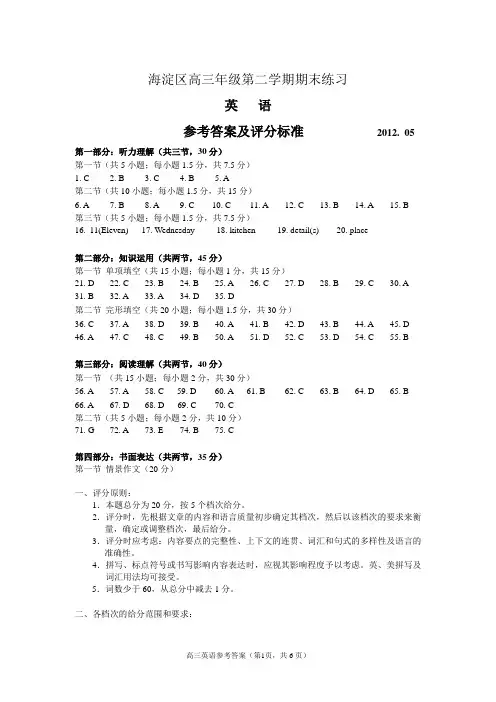
海淀区高三年级第二学期期末练习英语参考答案及评分标准2012. 05第一部分:听力理解(共三节,30分)第一节(共5小题;每小题1.5分,共7.5分)1. C2. B3. C4. B5. A第二节(共10小题;每小题1.5分,共15分)6. A7. B8. A9. C 10. C 11. A 12. C 13. B 14. A 15. B第三节(共5小题;每小题1.5分,共7.5分)16.11(Eleven) 17. Wednesday 18. kitchen 19. detail(s) 20. place第二部分:知识运用(共两节,45分)第一节单项填空(共15小题;每小题1分,共15分)21. D 22. C 23. B 24. B 25. A 26. C 27. D 28. B 29. C 30. A 31. B 32. A 33. A 34. D 35. D第二节完形填空(共20小题;每小题1.5分,共30分)36. C 37. A 38. D 39. B 40. A 41. B 42. D 43. B 44. A 45. D 46. A 47. C 48. C 49. B 50. A 51. D 52. C 53. D 54. C 55. B第三部分:阅读理解(共两节,40分)第一节(共15小题;每小题2分,共30分)56. A 57. A 58. C 59. D 60. A 61. B 62. C 63. B 64. D 65. B 66. A 67. D 68. D 69. C 70. C第二节(共5小题;每小题2分,共10分)71. G 72. A 73. E 74. B 75. C第四部分:书面表达(共两节,35分)第一节情景作文(20分)一、评分原则:1.本题总分为20分,按5个档次给分。
2.评分时,先根据文章的内容和语言质量初步确定其档次,然后以该档次的要求来衡量,确定或调整档次,最后给分。
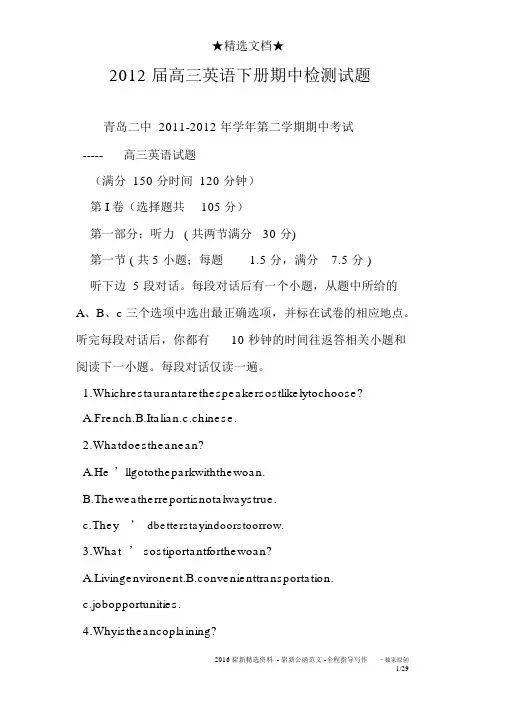
2012 届高三英语下册期中检测试题青岛二中 2011-2012 年学年第二学期期中考试-----高三英语试题(满分 150 分时间 120 分钟)第 I 卷(选择题共105 分)第一部分:听力( 共两节满分30 分)第一节 ( 共 5 小题;每题 1.5 分,满分7.5 分 )听下边 5 段对话。
每段对话后有一个小题,从题中所给的A、B、c 三个选项中选出最正确选项,并标在试卷的相应地点。
听完每段对话后,你都有10 秒钟的时间往返答相关小题和阅读下一小题。
每段对话仅读一遍。
1.Whichrestaurantarethespeakersostlikelytochoose?A.French.B.Italian.c.chinese.2.Whatdoestheanean?A.He ’llgototheparkwiththewoan.B.Theweatherreportisnotalwaystrue.c.They’ dbetterstayindoorstoorrow.3.What ’ sostiportantforthewoan?A.Livingenvironent.B.convenienttransportation.c.jobopportunities.4.Whyistheancoplaining?A.Hedislikesfilingdocuents.B.Hisworkisalwaysthesae.c.Hisco-workerwascareless.5.HowdidAdaprobablygetthefootball?A.Heboughtithiself.B.Heborroweditfrosoeoneelse.c.Itwasgiventohiasabirthdaygift.第二节(共15 小题;每题 1.5 分,满分22.5 分)听下边 5 段对话或独白。
每段对话或独白后有几个小题,从题中所给的A、B、c 三个选项中选出最正确选项,并标在试卷的相应地点。

北京海淀区⾼三年级第⼆学期期中练习英语试题及参考答
案
2012年05⽉23⽇亲,很⾼兴访问《北京海淀区⾼三年级第⼆学期期中练习英语试题及参考答案》⼀⽂,也欢迎您访问店铺()的⾼考频道,为您精⼼准备了2009⾼考外语⽇常练习的相关模拟考试试题内容!同时,我们正在加紧建设⾼考频道,我们全体编辑的努⼒全是为了您,希望您能在本次⾼考中能获得好的名次,以及考上满意的⼤学,也希望我们准备的《北京海淀区⾼三年级第⼆学期期中练习英语试题及参考答案》内容能帮助到您。
在即将到来的⾼考上助您⼀臂之⼒!加油,童鞋!
【店铺提供正确答案】。
北京市2012届高三下学期综合练习试题分类汇编之阅读理解北京市海淀区2012届高三下学期期中练习英语试题(2012海淀一模)第三部分:阅读理解(共两节,40分)第一节(共15小题;每小题2分,共30分)阅读下列短文,从每题所给的A、B、C、D四个选项中,选出最佳选项,并在答题卡上将该项涂黑。
AHow do you feel about watching other people work?Nothing is more refreshing on a warmsummer day than watching someone elsework.Right now, I’m sitting on my porchand watching young Beth baling(打捆)thebig field on top of the hill. She’s beenhaying that field for over ten years. I know:I put her on the tractor when she was just twelve years old.She picked a great day for baling. It’s not too hot, and there’s a nice breeze. On Monday, when she cut the field, it was so hot I thought the corn would start popping in the field. Didn’t stop her, though. She just stuck that big hat on her head, wrapped a wet handkerchief around her neck, and set to work. I remember when I would have done the same thing.While I’m here sucking a lemonade, Beth is driving the “hay(干草) train,” a tractor pulling a baler and an old wagon. You’d think someone her size would never be able to see over the tractor. But somehow she manages. When she’s finished, her tracks are very straight.The whole time she’s haying, that dog of hers is working just as hard, running along beside her like he’s afraid she’ll drive away without him. Beth sure knew what she was doing when she trained him.The way the machine works is pure poetry. Each row is pushed into shape. When just enough hay is in a bale, it is wrapped up and fastened together. A second or so later, the bale comes flying out and into the old wagon. The person who invented that machine sure was some kind of genius.That’s not to say it works perfectly. Every once in a while a bale misses the mark, especially when you are turning the machine at the end of a row. That means, of course, that you have to go back and pick up those bales and throw them into the wagon.I can remember when Beth’s mother was her age. She looked an awful lot like Beth does now. Makes a man proud to see his daughter and granddaughter taking such good care of themselves.Well, I suppose I should get up and fill this glass again. Not much fun sitting here with an empty glass.56. We can learn from the passage that at some time in the past the author ______.A. bought the tractor for BethB. forced Beth to work at an early ageC. worked in the field like BethD. trained the dog to help Beth work57. In the eyes of the author, the sight of Beth baling hay is _______.A. uncommonB. beautifulC. unforgettableD. changeable58. Before thrown into the wagon, the hay must be _______.A. tied upB. dried upC. cut upD. lined up59. Who do you think is telling this story?A. Beth’s mother.B. Beth’s father.C. Beth’s grandmother.D. Beth’s grandfather.BIf you haven’t heard or seen anything about Road Rage in the last few months, you’ve probably been avoiding the media. There have been countless stories about this new and scary phenomenon, considered a type of aggressive driving. You have most likely encountered aggressive driving or Road Rage recently if you drive at all.While drunk driving remains a critical problem, the facts about aggressive driving are surely as disturbing. For instance, according to the National Highway Transportation Safety Association, 41,907 people died on the highway last year. Of those deaths, the agency estimates thatabout two-thirds were caused at least in part by aggressive driving behavior.Why is this phenomenon occurring more than ever now, and why is it something that seemed almost nonexistent a few short years ago? Experts have several theories, and all are probably partially correct. One suggestion is sheer overcrowding. In the last decade, the number of cars on th eroads has increased by more than 11 percent, and the number of miles driven has increased by 35 percent. However, the number of new road miles has only increased by 1 percent. That means more cars in the same amount of space; and the problem is magnified in urban areas. Also, people have less time and more things to do. With people working and trying to fit extra chores and activities into the day, stress levels have never been higher. Stress creates anxiety, which leads to short temper s. These factors, when combined in certain situations, can spell Road Rage.You may think you are the last person who would drive aggressively, but you might be surprised. For instance, have you ever yelled out loud at a slower driver, sounded the horn long and hard at another car, or sped up to keep another driver from passing? If you recognize yourself i n any of these situations, watch out!Whether you are getting angry at other drivers, or another driver is visibly upset with you, there are things you can do to avoid any major conflict. If you are susceptible(easilyinfluenced) to Road Rage, the key is to discharge your emotion in a healthy way. If you are the target of another driver’s rage, do everything possible to get away from the other driver safely, including avoiding eye contact and getting out of their way.60. The first sentence in Para. 1 implies that ______.A. one may be angered by media reports and wants to avoid themB. the media coined the term "Road Rage" only a few months agoC. Road Rage has received much media coverage in the last few monthsD. people not interested in the media know little about recent happenings61. The underlined word “spell” in Para. 3 means ________.A. relieveB. causeC. spreadD. prevent62. Which of the following characterizes aggressive driving?A. Talking while driving.B. Driving at high speed.C. Sounding the horn when passing.D. Shouting at another driver.63. The last paragraph is intended to _________.A. tell people how to deal with Road RageB. inform people how aggressive drivers could beC. show people how to control themselves when angryD. warn people against eye contact with another driverCSmartphone Security BlanketsSecurity—for the information on your smartphone, as well as for the phone itself—is a hot topic these days. The truth is that you’re packing a lot of s ensitive information on your phone, and you should keep it safe.When it comes to physical security, iPhone users would do well to download Find My iPhone, a free app (application program) from Apple that allows you to visit a website and see your (lost, stolen or misplaced) phone on a map. You can then sound an alarm, send a message that will pop up on its screen, lock the phone or erase all your data.Android does not have an exact equivalent, but there are plenty of alternatives. A free app called Lookout offers the find-my-phone feature. The paid version allows you to wipe the data from your phone remotely.Then there is your coffee shop’s WiFi network. Anyone with minimal technical expert skill can snoop on(窥视)people using shared wireless networks, harvesting passwords and other personal data. Lookout’s apps will caution you when you’ve logged on to a n unsecure network, but cannot protect you once you’re there.In order to protect yourself on such networks, you can use a virtual private network, or V.P.N. This turns all your activity into nonsense to anyone trying to read along with you from across the Starbucks. It also keeps w ebsites from tracking you and, if you’re traveling, allows you to get access to sites that may be blocked in other countries.If you have an iPhone, the simplest V.P.N. app is probably Hotspot Shield, whose distinguishing feature is said to be that it automatically kicks in each time you start browsing (浏览), as opposed to other V.P.N. apps that require you to start them up manually. This matters, because even if you decide you want a V.P.N. app, you want to spend approximately zero time thinking about it. For the most part, that was true of Hotspot Shield, though occasionally it took a while to connect or temporarily lost connection without warning. I found myself having to turn the app on and off sometimes, which involved setting my phone constantly.If even reading about the settings on your phone drives you crazy, then it is probably best to stay away from a V.P.N. app. But if you’re the type who can’t resist checking your bank balance from your corner bar, the hassle may be preferable to the risk.64. Which of the following can warn you against the unsecure network?A. Android.B. V.P.N.C. Lookout.D. Find My iPhone.65. By using V.P.N., users can _______.A. find their lost phone on the InternetB. erase all the data from the phone remotelyC. check their bank balance now and thenD. save their browsing from being tracked66. The underlined word “that” in Para. 6 refers to the fact that _____.A. a V.P.N. app kicks in automaticallyB. the user starts V.P.N. apps manuallyC. the app takes a while to connectD. users spend no time thinking about itDWhy are people interested in eating raw foods or whole foods? One reason is that eating these types of food reduces the risk of acid accumulation in your body.Raw and whole foods are usually digested more efficiently than cooked and refined foods. When we cook foods, we destroy the natural enzymes(酶) that are part of the food in its raw form. These enzymes were intended by nature to help us digest the food. When we consume food without these natural enzymes, our bodies either digest the food improperly or allow too many nutrients to be absorbed into the bloodstream. In both instances, the result is obesity. When too many nutrients are absorbed at once, the body grows fat. Improperly digested food moves slowly through the digestive tract, where it becomes increasingly acidic. To protect its vital organs from this acidic waste, the body changes the acid into fat and stores it safely away from the organs.Processed foods contain chemical elements, which might confuse the appetite mechanism that tells us when we’ve had enough to eat; as a result,people often overeat. Processed foods also upset the digestive cycle. The body will either identify these foods as allergens and then store them safely away from the organs as fat, or the remains of undigested food will become acidic and enter the bloodstream as acid waste, which will stick to the blood vessel walls and block the passage of vital oxygen and nutrients heading for the body’s cells. The body’s metabolism (新陈代谢) becomes inactive, and the result is weight gain and obesity.The accumulation of acid in the digestive tract makes digestion increasingly inefficient. When that happens, even healthy foods can become acidic and the food allergies will become more common.To stop this vicious circle in its tracks, people need to consume food and supplements that will neutralize the acid already accumulated in body. Eating the right types of raw and whole foods can help. It’s also important to restore your enzyme bala nce. You need to identify and avoid the foods that cause acid accumulation and consume the foods that increase enzyme production. If you truly want to change and help your body heal itself, you need to take an active approach.67. It can be inferred from Para. 2 that _______.A. foods with natural enzymes help people keep fitB. we’d better be cautious about raw and whole foodsC. it is essential for people to protect their vital organsD. giving up cooked and refined foods is a new lifestyle68. Processed foods are unhealthy because they _______.A. destroy body’s cellsB. may lead to obesityC. are difficult to digestD. stop body’s metabolism.69. What is the main purpose of this passage?A. To warn people of the problem of obesity.B. To advocate eating more raw and whole foods.C. To inform people of the harm of processed foods.D. To tell the differences between raw and processed foods.70. What is likely to be talked about following the last paragraph?A. Different causes of acid accumulation.B. Correct ways to cook raw foods.C. Suitable types of raw and whole foods.D. Active approaches to avoid acid.第二节(共5小题;每小题2分,共10分)根据短文内容,从短文后的七个选项中选出能填入空白处的最佳选项。
海淀区高三年级第二学期期中考试(一模)英语本试卷共12 页,共150 分。
考试时间120 分钟。
注意事项:1.考生务必将答案答在答题卡上,在试卷上作答无效。
2.答题前考生务必将答题卡上的姓名、准考证号用黑色字迹的签字笔填写。
3.答题卡上选择题必须用2B 铅笔作答,将选中项涂满涂黑,黑度以盖住框内字母为准,修改时用橡皮擦除干净。
非选择题必须用黑色字迹的签字笔按照题号顺序在各题目的答题区域内作答,未在对应的答题区域内作答或超出答题区域作答的均不得分。
第一部分:听力理解(共三节,30 分)第一节(共5 小题;每小题1.5 分,共7.5 分)听下面5 段对话。
每段对话后有一道小题,从每题所给的A、B、C 三个选项中选出最佳选项。
听完每段对话后,你将有10 秒钟的时间来回答有关小题和阅读下一小题。
每段对话你将听一遍。
1. What does the man do now?A. A teacher.B. An editor.C. A journalist.2. Where is the hospital?A. At the crossing.B. Beside a drugstore.C. Near a supermarket.3. Which of the following does the woman want to change?A. A $10 note.B. A $20 note.C. A $50 note.4. What does the man plan to do this evening?A. Go to the gym.B. Visit Mr. Black at school.C. Attend Mr. Black’s lecture.5. What is the man doing?A. Making a suggestion.B. Making a request.C. Making a complaint.第二节(共10 小题;每小题1.5 分,共15 分)听下面4 段对话或独白。
2012海淀区高三年级一模试题(第二学期期中练习)语文2012.4第一部分(共27分)一、本大题共5小题,每小题3分,共15分。
1.下列词语中,字形和加点的字的读音全都正确的一项是A.镌刻余音绕粱牵掣.(zhì)揆情度.(duó)理B.观瞻激浊扬清商贾.(ɡǔ)良莠.(yǒu)不齐C.棉薄两袖清风迄.(qì)今矫.(jiāo)揉造作D.斧正闻过饰非聒.(ɡuā)噪若即.(jí)若离2. 下列句子中,加点的成语使用不恰当...的一项是A. 春天的颐和园,小草带着泥土的芳香钻了出来,柳枝在昆明湖畔轻轻摇曳,桃花在枝头尽情绽放,真是秀色可餐....。
B. 中华民族几千年的文明积淀和不绝如缕....的文化传统,是我国新时期文化发展的起点,是我们民族振兴的基石。
C. 在全球经济一体化的浪潮下,一个经济体爆发经济危机,就会冲击到其他经济体,任何开放的国家都难以独善其身....。
D. 福岛核事故发生一周年之际,日本政府首次组织记者进入核电站采访,让他们按照规定的路线走马观花....地转了一遭。
3.下列句子中,没有语病的一句是A. 虽然中国公民在苏丹遭劫持是一起偶发事件,但中国公民出国要清楚地了解海外的安全形势,防止各类安全风险,采取有效措施。
B. 男子网坛两大巨头的决战持续近6小时,成为史上最长的大满贯决赛展现在球迷面前,这场决战开启了世界男子网球赛的新时代。
C. 文物局提出,针对当前首都城市的发展与古都名城保护,相关单位应加强文物安全保护力度,落实各项监管责任。
D.麦当劳(中国)有限公司销售过期食品,国家食品安全监管司要求其立即进行整改,以防止此类问题再次出现。
4.下列有关文学常识的表述,有错误的一项是A.中国第一部纪传体通史《史记》是由司马迁撰写的,后人称赞它“不虚美,不隐恶”,具有秉笔直书的“实录”精神。
B. 诸葛亮的《出师表》、李密的《陈情表》分别体现了中国古代文化中的忠、孝传统,这两篇文章言辞恳切,感人至深。
海淀区高三年级第二学期期中练习英语2012.04本试卷共12页,共150分。
考试时间120分钟。
第一部分:听力理解(共三节,30分)第一节(共5小题;每小题1.5分,共7.5分)听下面5段对话。
每段对话后有一道小题,从每题所给的A、B、C三个选项中选出最佳选项。
听完每段对话后,你将有10秒钟的时间来回答有关小题和阅读下一小题。
每段对话你将听一遍。
1. What does the woman want?A. A toothbrush.B. Some food.C. Some books.2. When will the Chief Editor probably see the man?A. At 9:00.B. At 10:30.C. At 11:00.3. Where was the man yesterday afternoon?A. At a lake.B. In a café.C. In a cinema.Text 3:W: Did you have a good time yesterday?M: Yes, I went fishing with my friend at a lake, but it rained at noon, so we stayed in a café before we went to the cinema at 7 p.m.4. What is the relationship between the two speakers? (中)A. Husband and wife.B. Receptionist and visitor.C. House seller and buyer.5. Where will the man probably live next year? (难)A. In his house.B. In an apartment.C. In the dormitory.Text 5:M: I don‟t think I want to live in the dormitory next year. I need more privacy.W: But check out the cost of renting an apartment first. How about moving back home?M: Oh, it‟s too far. Maybe I‟ll still stay on campus.第二节(共10小题;每小题1.5分,共15分)听下面4段对话或独白。
北京市海淀区高三年级第二学期期中练习英语英语卷·北京市海淀区高三年级第二学期期中练习本试卷分第Ⅰ卷(选择题)和第Ⅱ卷(非选择题)两部分。
共150分。
考试时间120分钟。
第I 卷(选择题,共115分)第一部分:听力理解(共两节,满分30分)第一节(共5小题;每小题1.5分,满分7.5分)听下面5段对话。
每段对话后有一个小题,从题中所给的A 、B 、C 三个选项中选出最佳选项,并标在试卷的相应位置。
听完每段对话后,你都有10秒钟的时间来回答有关小题和阅读下一小题。
每段对话仅读一遍。
1.Where does the conversation take place?A .At home.B .At a hotel.C .In a street.2.When can the woman get the computer?A .On Thursday.B .On Wednesday.C .On Tuesday.3.What happened to the man?A .He broke his leg.B .He hurt his arms.C .He had a car accident.4.Does the woman suggest baking the cakes for another ten minutes?A .Maybe.B .No.C .Certainly.5.What is the woman doing?A .Offering to do a favor.B .Asking for permission.C .Asking for help.第二节(共15小题;每题1.5分,满分22.5分)听下面6段对话或独白。
每段对话或独白后有几个小题,从题中所给的A ,B ,C三个选项中选出最佳选项,并标在试卷的相应位置。
听每段对话或独白前,你将有时间阅读各个小题,每小题5秒钟;听完后,每小题将给出5秒钟的作答时间。
海淀区高三年级第一学期期中练习英语参照答案及评分标准第一部分 :听力理解 (共三节 ,30 分第一节 (共 5 小题;每题 1.5 分,共 7.5 分1.C2.A3.B4.B5.A第二节 (共 10 小题 ;每题 1.5 分,共 15 分6.A7.C8.B9.C 10. C 11. B 12. A 13. C 14. A 15. B第三节 (共 5小题 ;每题 1.5 分,共 7.5 分★每题超出一个词不计分 ;★拼写错误不计分 ;★大小写、单复数错误扣分。
16. Murphy 17. Student 18. February(Feb不.计分19. two-bedroom (2-bedroom 20. washer(washing-machine不计分第二部分 :知识运用 (共两节 ,45 分第一节单项填空 (共 15 小题 ;每题 1 分,共 15 分21.35.D第二节完形填空 (共 20 小题 ;每题 1.5 分,共 30 分36.50.第三部分 :阅读理解 (共两节 ,40 分第一节 (共 15 小题;每题 2 分,共 30分56.D 57. C 58. A59. B 60. C 61. B 62. A 63. A 64. C 65.D 66. D 67. D 68. C 69. A 70.B第二节 (共 5 小题;每题 2 分,共 10 分71. F 72. B 73. A 74. C 75. D第四部分 :书面表达 (共两节 ,35 分第一节情形作文 (20 分一、评分原则 :1.此题总分为 20 分 ,按 5 个品位给分。
2.评分时 ,先依据文章的内容和语言质量初步确立其品位,而后以该品位的要求来衡量,确立或调整品位 ,最后给分。
3.评分时应试虑 :内容重点的完好性、上下文的连结、词汇和句式的多样性及语言的正确性。
4.拼写、标点符号或书写影响内容表达时,应视其影响程度予以考虑。
英、美拼写及词汇用法均可接受。
海淀区高三年级第二学期期中练习英语参考答案及评分标准2012. 04 第一部分:听力理解(共三节,30分)第一节(共5小题;每小题1.5分,共7.5分)1. A2. C3. B4. A5. C第二节(共10小题;每小题1.5分,共15分)6. A7. C8. B9. B 10. B 11. C 12. A 13. A 14. B 15. C 第三节(共5小题;每小题1.5分,共7.5分)16. August 17. Germany 18. private 19. 850 20. Forest第二部分:知识运用(共两节,45分)第一节单项填空(共15小题;每小题1分,共15分)21. B 22. B 23. A 24. A 25. C 26. C 27. D 28. C 29. A 30. D 31. B 32. D 33. A 34. C 35. D第二节完形填空(共20小题;每小题1.5分,共30分)36. A 37. C 38. D 39. A 40. B 41. B 42. C 43. B 44. D 45. D 46. C 47. C 48. A 49. B 50. A 51. D 52. C 53. A 54. D 55. B第三部分:阅读理解(共两节,40分)第一节(共15小题;每小题2分,共30分)56. C 57. B 58. A 59. D 60. C 61. B 62. D 63. A 64. C 65. D 66. A 67. A 68. B 69. B 70. C第二节(共5小题;每小题2分,共10分)71. D 72. C 73. G 74. F 75. E第四部分:书面表达(共两节,35分)第一节情景作文(20分)一、评分原则:1.本题总分为20分,按5个档次给分。
2.评分时,先根据文章的内容和语言质量初步确定其档次,然后以该档次的要求来衡量,确定或调整档次,最后给分。
3.评分时应考虑:内容要点的完整性、上下文的连贯、词汇和句式的多样性及语言的准确性。
4.拼写、标点符号或书写影响内容表达时,应视其影响程度予以考虑。
英、美拼写及词汇用法均可接受。
5.词数少于60,从总分中减去1分。
二、内容要点:1.到达2.跳断桥3.翻越逃生墙4.合影三、各档次的给分范围和要求:四、One possible version:Last Friday, my class took part in a meaningful and challenging course—Outward Bound.Early in the morning, we got to an Outward Bound centre on our school bus. Upon arrival,we were divided into several groups and our coach introduced the course to us. Shortly afterwards, we got involved in various activities. One of them was jumping across a broken bridge. I was afraid at first, but with the encouragement of the coach, I finally made it. What impressed me most was climbing over a wall to “escape.” We helped one another and all of us managed to “survive.”Before we left the centre, we had a photo taken to record the unforgettable experience, which gave us a good chance to build up courage and improve our sense of teamwork.第二节开放作文(15分)一、评分原则:1.本题总分为15分,按4个档次给分。
2.评分时,先根据文章的内容和语言质量初步确定其档次,然后以该档次的要求来衡量,确定或调整档次,最后给分。
3.评分时应考虑:文章是否扣题,结构是否完整,内容是否充实、健康,思维是否活跃,逻辑是否清晰,语言是否规范,交际是否得体。
4.拼写、标点符号或书写影响内容表达时,应视其影响程度予以考虑。
英、美拼写及词汇用法均可接受。
5.词数少于50,从总分中减去1分。
三、Possible versionsIn the picture, a man on a boat is searching for some fish with a telescope. However, his efforts do not pay off, for the net is still empty. Amusingly, a school of fish is swimming just nearby, but he completely ignores them.What the picture conveys is that we should never aim too high, neglecting the readily attainable goal. If the man stopped focusing on the distant waters and looked around, the fish near the boat would be an easy harvest for him. This is not uncommon in our daily life. When we aim to build one ridiculously large project, we complete nothing; when we aim for a small goal, we complete it. Let’s be more practical.听力录音文本Text1:M: Hello, grandma! Tomorrow I will bring you some books and some cookies. Is there anything special you’d like?W: Mm… I don’t feel like reading or eating, but buy me a toothbrush on your way here.Text 2:M: Do you think the Chief Editor could see me tomorrow before 9:00?W: I am afraid he won’t be in until 10:30.M: Is 11:00 any good then?W: Yes, I’ll write down that time.Text 3:W: Did you have a good time yesterday?M: Yes, I went fishing with my friend at a lake, but it rained at noon, so we stayed in a cafébefore we went to the cinema at 7 p.m.Text 4M: What do you think of the house?W: Well, the living room is huge, the balcony is nice, but the baby room is kind of small for our two kids.M: You’re right. And it’s not as cheap as the last apartment we saw.Text 5:M: I don’t think I want to live in the dormitory next year. I need more privacy.W: But check out the cost of renting an apartment first. How about moving back home?M: Oh, it’s too far. Maybe I’ll still stay on campus.Text 6M: Well! Congratulations! How do they decide to hire you?W: I sent them a writing sample.M: What did you write about?W: Actually, it was a lot of fun. I wrote about the students’ play that was performed this month. M: Oh, I saw that play.W: Really? I wrote about people’s reaction to it.M: I wish I were a better writer. Working for the paper sounds like fun.W: Well, they’re looking to add one or two more photographers to the staff.M: You’re kidding! Maybe I’ll go over and apply.W: If you want, I’ll walk over with you to the newspaper office and introduce you to the photographic editor.M: That would be terrific!Text 7W: Well, what did you think about the last candidate?M: She had a very impressive resume, but she seemed to lack the confidence that I think a good manager needs.W: What made you think she wasn’t very confident?M: Did you notice the way that she avoided making eye contact with us while she talked?W: She was a bit nervous I guess. What else?M: When she first walked into the room to greet us, she didn’t shake our hands or introduce herself at all. I thought that was a bit unprofessional.W: You are right.M: Did you also notice the way she sat in her chair during most of the interviews? It was horrible. Even worse, she didn’t seem to have any sense about people’s personal space. She didn’t keep enough distance between us during the meeting.W: That’s true. I guess we’ll have to keep looking for a manager then.Text 8M: Have you ever seen Bill Gates’ home on the Internet?W: No, what’s it like?M: It’s got its own library, theatre, swimming pool and a guest house. The house itself has about ten different rooms. It’s absolutely amazing.W: Would you want to live there?M: I think the house is fantastic, but I wouldn’t want to live there. You’d have to hire one or two people to clean all the rooms. It’s too hard.W: What’s your dream home like then?M: My dream home is actually just a small cottage in a quiet village.W: Would you want to buy an old cottage or a new one?M: Old homes are great because they’ve got character, I think that’s important.W: Is that why you wear secondhand clothes as well because they’ve got character?M: No, that’s just because I don’t have enough money to buy new clothes all the time.W: I see, if you lived in an old house, would you decorate it in a modern way?M: Definitely not. I would keep it in its original state. I’d love to imagine what it would be like to live in the olden days.Text 9W: Good afternoon, everybody. Thank you for inviting me here to talk about safety in the dormitory and personal security.First, a few points to bear in mind. You’ll notice the doors of your dorm have two types of locks. Make sure you double lock your door however long you are going out for. Make sure when you go out, all the windows are closed. If you have got expensive equipment in your room, first of all, insure it. So many people lose things and haven’t got insurance.This brings me onto personal security. Wherever possible, avoid walking alone late at night, especially females. Avoid dark streets, and try to stick to the well-lit areas whenever possible. Alsoif you know you are going to be up late, make sure you’ve got enough money for a taxi to get home, or arrange to stay with friends for the night. It may sound absurd, but don’t forget the university actually offers free self-defense classes. I hope it’s something you’d never have to use, but it is certainly worth going to a few self-defense sessions.Text 10W: Good morning! Premier Travel services. This is Karen speaking.M: Hello, this is Alex Lee. I want to plan a trip to Europe. Can you give me some advice?W: Of course! When would you like to go on the trip?M: In August.W: OK, and which country would you like to go to?M: Well, I like Sweden best but this time I’d prefer to go to Germany.W: Got it. Would you like to join a group or plan a private trip?M: My wife and I would prefer the private trip.W: OK, we have a 6-day trip for $850 per person, or you can take an 8-day trip for $1,000 per person.M: I think 6 days is enough. Now…what sites do you recommend I see?W: Well, the Romantic Road is one of Germany’s best scenic routes. And if you want to see the side of Germany with rolling hills, small villages and lush forests, visit Black Forest.M: Black Forest sounds great! I’m excited about the 6-day trip!W: Great! I’ll call you next week to confirm more details.M: All right! My phone number is 55562239. Thanks for your help.W: You’re welcome, goodbye!。